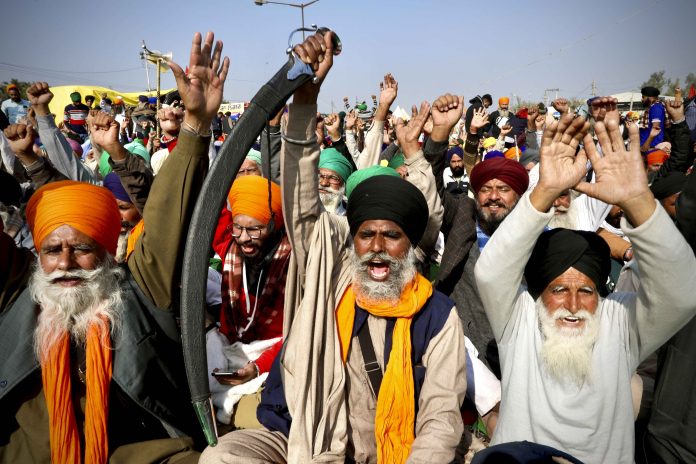
By ASHOK SHARMA
Associated Press
NEW DELHI (AP) — India’s Supreme Court on Wednesday offered to set up a mediation panel to end a three-week protest by tens of thousands of farmers who are demanding the repeal of new agricultural reform laws that they say will drive down crop prices and devastate their earnings.
The court sent notices to the government and the farmers’ representatives across the country seeking their views on the proposal and set Thursday as the date for a possible decision.
The farmers have been blocking half a dozen major highways on the outskirts of New Delhi for three weeks and say they won’t leave until the government quashes what they call the “black laws” passed by Parliament in September.
Darshan Pal Singh, a Sikh leader, said a 68-year-old Sikh priest allegedly shot and killed himself at a protest site on the outskirts of the capital.
Police said they were investigating the circumstances of his death. Singh told reporters that police found a note from the priest in which he said he was sacrificing his life “to express anger and pain against the government injustice.”
Indian media reports have said he went to his car and allegedly shot himself.
Police officer Ganga Ram Punia declined to provide details while an autopsy was being carried out in Karnal, a town in Haryana state.
Opposition Congress party leader Rahul Gandhi in a tweet blamed the government’s apathy toward the priest’s death and urged the government to meet the farmers’ demands.
Earlier, Chief Justice S.A. Bobde and Justices A.S. Bopanna and V. Ramasubramanian made the offer to set up the panel after five rounds of talks failed to end the impasse between the government and farmers.
“Your negotiations with protesting farmers have not worked apparently until now,” the Press Trust of India news agency cited the judges as telling government Solicitor-General Tushar Mehta.
In addition to blocking the movement of people, the massive protest has dealt a blow to manufacturing and business in northern India.
The protesting farmers say the laws will lead to the cartelization and commercialization of agriculture and make farmers vulnerable to corporate greed.
Protest leaders have rejected the government’s offer to amend some contentious provisions of the laws.
Farmers fear the government will stop buying grain at minimum guaranteed prices and corporations will then push prices down. Prime Minister Narendra Modi’s government has said it is willing to pledge that guaranteed prices continue.
Nearly 60% of the Indian population depend on agriculture for their livelihoods.
The government insists the reforms will benefit farmers and says they will enable farmers to market their produce and boost production through private investment.
On Friday, a farmers’ group filed a petition with the Supreme Court seeking the repeal of the three laws. The Bharatiya Kisan Union, or Indian Farmers’ Union, argued that the laws were arbitrary because they were enacted without proper consultations with stakeholders.



















